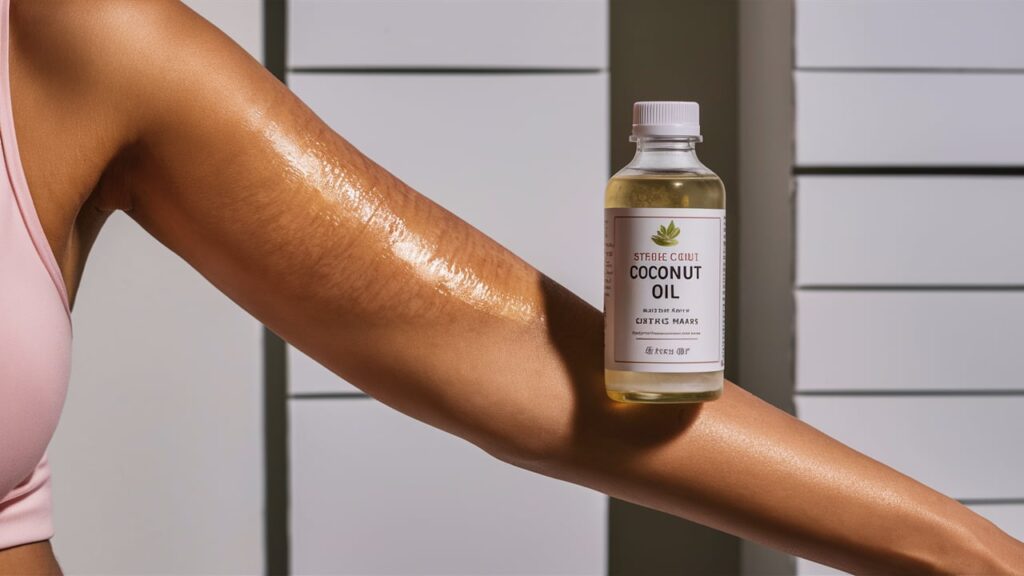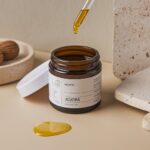- Research shows coconut oil is highly comedogenic, meaning it can clog pores and worsen acne, especially for acne-prone skin.
- Lauric acid in coconut oil has a waxy texture that can trap dead skin cells and bacteria, leading to breakouts.
- Dermatologists generally advise against using coconut oil on the face, particularly for oily or acne-prone skin.
- Formulated products with coconut oil may be less risky than using raw coconut oil, depending on other ingredients.
Coconut oil is often praised for its moisturizing benefits and natural properties. It’s a featured ingredient in everything from DIY face masks to high-end beauty products. For some people, coconut oil can be a miracle worker; for others, it may be a recipe for breakouts and clogged pores.
This raises the million-dollar question: Is coconut oil really comedogenic? In other words, does it clog your pores and contribute to acne? We’ve done the research so you don’t have to. In this article, we’ll dive deep into the science, hear from top dermatologists, and read real-life user experiences.
Click Here to View our Pore Clogging Ingredient Checker
What Research Says About Coconut Oil’s Comedogenicity
Studies indicate that coconut oil is highly comedogenic, meaning it has the potential to clog pores. A specific study even grouped coconut oil with other oils like mustard oil and liquid paraffin, stating that they are not ideal for acne-prone skin. Why? Because these oils, including coconut oil, can block pores and worsen breakouts. So, if you’ve ever wondered why your skin looks duller or more inflamed after using coconut oil, this could be the reason.
The root of this issue lies in coconut oil’s saturated fatty acid content, particularly lauric acid. Lauric acid is fantastic for fighting bacteria but has a thick, waxy texture. This texture can create a barrier on the skin, trapping dead cells and bacteria that should be shed naturally. When those cells and bacteria get trapped in your pores, it can lead to breakouts, especially for people with acne-prone or oily skin.
But before we dismiss coconut oil entirely, it’s important to acknowledge its moisturizing benefits. Research shows it’s hydrating, which is why so many swear by it for softening the skin. It’s a double-edged sword: while it’s deeply moisturizing, it can also lead to pore blockages if you’re not careful. Those with dry or sensitive skin might find it beneficial, while those with oily skin might need to stay far away.
Is Beeswax Non-Comedogenic? The Real Impact on Your Skin
Dermatologists Weigh In: The Verdict on Coconut Oil
Dermatologists have seen both sides of the coconut oil coin and are not shy about sharing their opinions. While some caution against using it on acne-prone skin, others believe its comedogenicity depends on how it’s used.
Krupa Koestline: Clean Cosmetic Chemist’s Take
Krupa Koestline, a clean cosmetic chemist and founder of KKT Consultants, reminds us that;
“You cannot predict the overall comedogenicity of a product based on a single ingredient.” She highlights that while raw coconut oil can clog pores, products containing coconut oil might not have the same effect because other ingredients can alter how it behaves on the skin.
In other words, using pure coconut oil might lead to breakouts, but a product formulated with it could be less risky.
“Several tests have shown that finished products using comedogenic ingredients are not necessarily comedogenic,” she adds.
Natalie Aguilar: Celebrity Esthetician’s Warning
Celebrity esthetician Natalie Aguilar offers a straightforward warning. She says,
“When it comes to taking care of oily, acne-prone skin, some people resort to deep purifying cleansers that strip the skin of all essential moisture,” Aguilar explains that while coconut oil can provide moisture, it can also block pores due to its waxy texture.
According to her, this can lead to trapped dead skin cells and bacteria. “Coconut oil can definitely clog your pores,” she says, recommending that it should be used cautiously, especially when applied in its raw form.
Dr. Morgan Rabach: Rating Coconut Oil on the Comedogenic Scale
Dr. Morgan Rabach, a board-certified dermatologist, is particularly cautious about coconut oil for those with acne-prone skin. She gives coconut oil a four on the comedogenic scale (with five being the highest likelihood of clogging pores).
“For anyone with acne-prone or oily skin, I would advise against using coconut oil,” she advises. Coconut oil’s thick consistency can trap impurities, making it a potential acne trigger.
Dr. Sherrie Straughn: Recommending Alternatives
Dr. Sherrie Straughn echoes this caution:
“Coconut oil is comedogenic, which means it can clog pores. Any product that clogs pores can make skin oily and result in acne.” Like other dermatologists, Dr. Straughn recommends that those with acne-prone skin avoid coconut oil altogether, particularly as a facial moisturizer.
From these experts, we get a clear message: While coconut oil has its perks, it might not be the best option for those with acne-prone skin. Be mindful of how it interacts with your skin type, and always patch-test before going all in.
Real User Experiences: Coconut Oil, Friend or Foe?
When it comes to real-life results, opinions on coconut oil vary wildly. Some users love it, while others regret ever using it on their skin. Let’s dive into what real people have experienced, from glowing reviews to total disasters.
Reddit User: Coconut Oil Is a No-Go for the Face
One Reddit user shared their experience, saying:
“Coconut oil is not good for facial use, it does cause breakouts. For the body, it’s great as a moisturizer. Try rosehip, Marula, or argan oil for the face.” This user’s experience aligns with the concerns voiced by dermatologists, particularly those who warn against using coconut oil on acne-prone areas like the face.
Acne.org User: “My Skin Has Never Been the Same”
One user on Acne.org shared a particularly negative experience:
“I used coconut oil on my face three days in a row and my skin has never been the same. Cystic acne, closed comedones and malassezia plague my face.” This unfortunate reaction highlights how drastically coconut oil can impact sensitive skin, particularly if your skin doesn’t react well to it.
Byrdie’s Conclusion: Proceed with Caution
Beth Krietsch, writing for Byrdie, summarized the general consensus:
“Coconut oil is widely considered to be pore-clogging and, as such, is generally not recommended if you have acne-prone skin.” It’s a sentiment echoed by many: coconut oil is great, but it might not be for everyone, especially if you’re prone to breakouts.
The Final Verdict: Is Coconut Oil Right for You?
The debate on coconut oil’s comedogenicity isn’t going away anytime soon, and for good reason. With its hydrating and antimicrobial properties, it seems like a skincare hero. But for those with acne-prone or oily skin, the risks might outweigh the rewards. Coconut oil can clog pores, leading to breakouts and acne flare-ups, particularly when used in its pure form.
So, should you use coconut oil in your skincare routine? It all comes down to your skin type. If you have dry, flaky, or normal skin, coconut oil might be your best friend. However, if you have oily or acne-prone skin, you should proceed with caution. The alternative is to consider one of the alternative oils like rosehip or argan, which are less likely to clog pores.

I’m a devoted organic skincare enthusiast, passionate about the natural, wholesome goodness that organic products bring to our skin.
Organic skincare isn’t just a hobby for me—it’s a lifestyle. Every product I use, recommend, and write about has been carefully chosen for its purity and effectiveness. Everything I write about is backed by scientific studies, dermatologists’ opinions, and user experiences.
I also excel at tackling skincare challenges with innovative, organic solutions.


